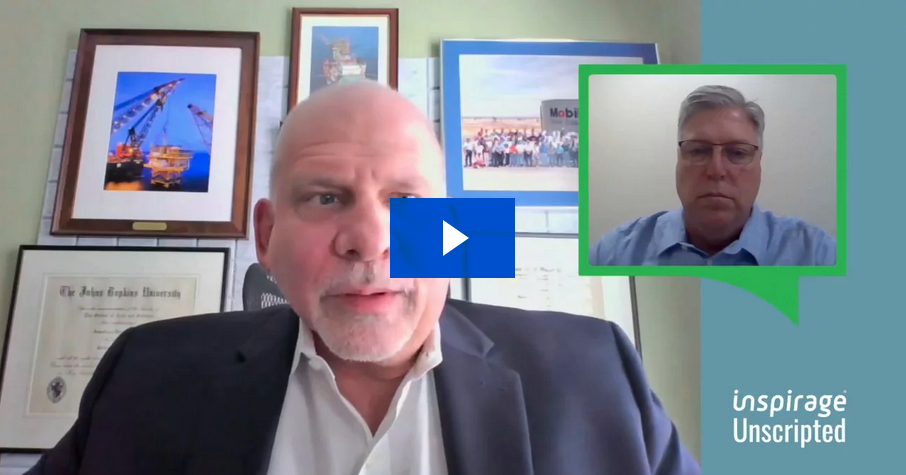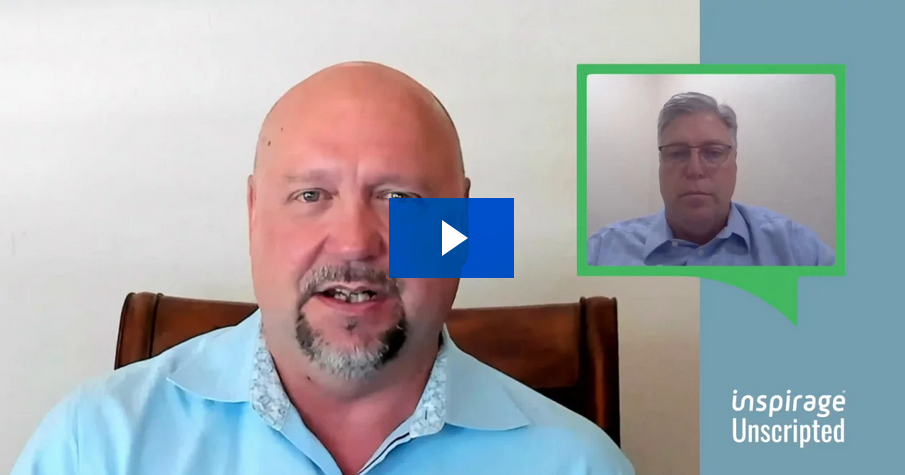Record-high oil and gas prices have been making headlines across the world in 2022, inspiring closer scrutiny of the challenges and opportunities the oil and gas industry is facing as it races to adapt to an uncertain future. To help you view these important trends from a well-informed perspective, Inspirage recently launched its new “Unscripted” series of video interviews. In these two sessions, Oracle executives explain recent developments surrounding oil and gas and how they may influence transformative strategies employed by companies in the industry.
Lights, camera, insights!
Hosted by Derron Mirtsching, Solution Director for Business Development and Supply Chain Management at Inspirage, “Oil & Gas Unscripted, Part 1,” features Jon Krome, Executive Director of Oil and Gas Transformation and Strategy at Oracle. “Oil & Gas Unscripted, Part 2” points the camera at Mitch Raley, Director of Business Value Services at Oracle. (Each video is only 15 minutes long, so they’re easy to watch in their entirety whenever you get a chance.)
As Krome noted, last year’s United Nations Climate Change Conference, commonly referred to as “COP26,” helped reinforce public perceptions of the connections between climate change and the oil and gas industry. That, in turn, is forcing a reconsideration of how the demand for more climate-conscious energy resources might influence emerging strategies.
“There’s going to be a drive to electrify,” he said. “Carbon production will become a new measure of interest, much like oil and gas production or water production. But electrification needs to be done wisely because electrification that isn’t powered by a renewable or lower-carbon energy source is really nothing more than carbon shifting. You’re shifting the carbon output from the piece of machinery itself to the electricity provider. As hydrocarbon demand eventually starts to fall, either because of regulation or new technology, oil and gas producers will feel new pressures.”
One trend… multiple outcomes?
Krome also notes that today’s higher prices for oil and gas present seemingly contradictory implications for future investment in the industry. “Higher prices are an incentive for oil companies to keep doing what they’re doing,” he said. “Higher oil prices make more difficult projects much more appealing for them and, at least in the short term, siphon off investments in other businesses. At the same time, however, higher prices are an incentive for alternative fuel sources. Can you imagine if oil went to $200 a barrel? All of a sudden, a lot of renewable projects would start to look very good.”
When you add other considerations to the mix, he said, such as ESG (environmental, social, and corporate governance) priorities, the importance of effective data management increases. So, too, does the need to harness IoT or the internet of things. “In its most general form, IoT has come to mean using the industrial internet to collect, manage, and analyze information,” Krome said. “That’s how we’re going to gather a lot of the data that we’ll need.” To hear more of his thoughts on that subject — and about the future role of machine learning and artificial intelligence in the industry — watch “Oil & Gas Unscripted, Part 1.”
Delving into digital transformation
On a related note, Raley believes digital transformation will be essential to oil companies’ ability to get quicker results and subsequently build on them. “The oil and gas companies that have predominantly lived in a world of monolithic architectures and built a lot of different systems are now realizing they have a lot of technology debt that’s preventing them from innovating and moving forward,” he said.
“For them, digital transformation means they not only have to transform their systems but also change their thinking. And they need to transform their processes,” Raley added. “A lot of their processes are not nimble enough to carry them forward. Part of that digital transformation involves adopting newer and emerging technologies like the cloud. In addition, the IoT, machine learning, and artificial intelligence will help automate more of their mundane processes. So, we’re not just talking about technology, but also about the people and the processes involved.”
His insights aren’t lost on those in the oil and gas industry who are searching for efficient ways of enhancing their operations and success. “I recently spoke with a customer who said that it takes up to 12 days — 12 days! — just to gather all the information they need from their disparate ERP (Enterprise Resource Planning) systems. We’re now talking to them about digital transformation and what that means.” To hear what he tells customers in that situation, and to learn more about how he believes they should address their technology debt, tune into “Oil & Gas Unscripted, Part 2.”
Coming soon
There are more Unscripted sessions in the pipeline, too. Stay tuned for upcoming episodes focusing on the Inspirage PLM (Product Lifecycle Management) team’s Recipe Management and Supplier Portal solutions.

